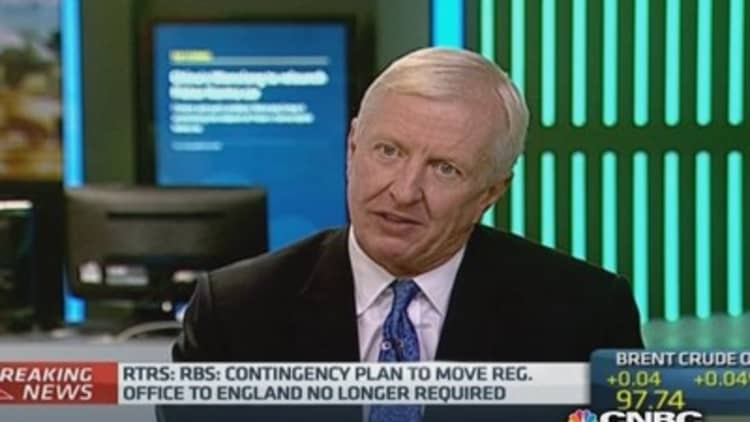Structural and labor market reforms underway in France will help ensure that the Group of 20 meets the goal set out in February of boosting global growth by two percentage points within five years, Michel Sapin, the country's finance minister, told CNBC at the G-20 meeting in Australia on Sunday.
"The first thing [we must do] is… ensure that growth in 2014 and 2015 is higher… within the European framework," he said. "We will also put in place structural reform that will provide more capacity for businesses in terms of investment for employment, for margins to be larger, and we are substantially reducing taxation and actual contributions over a period of four years."
"The second reform we're taking at this stage is labor market reform," he said. "Negotiations with representatives of the unions and employers [will] ensure that there's more flexibility at the same time as maintaining a certain level of safety for workers, in particular the workers that may be made redundant, in part with a training scheme that would allow them to find work again in good conditions."
Read More France economic row could risk 'political crisis'
Sapin is confident that G-20 will reach its growth target as "considerable work has already been put in place by all member countries".

However, he noted that the group must overcome headwinds to ensure the goal is met.
"We have short-term concerns because in some continents, I'm thinking of Europe in particular, growth at this stage is insufficient and we have to create stimulus for that growth to recover in the mid-term to a level that would be satisfactory," he said.
Should Germany step up?
Last year Germany came under criticism from the United States and European Commission for its current account surplus of nearly $270 billion, which some economists believe contributed to the euro zone's financial crisis.
Read More G-20: nearing growth goal, but need more from Europe
In September, the Ifo think tank said Germany is on track to achieve a record current account surplus in 2014, raising pressure on Berlin to do more to boost domestic demand and invest at home.
"Germany is currently in a better place than many other countries in the euro zone [and is] aware that this situation allows it to put in place investment programs, for example infrastructure, that will be very positive for the entire euro zone," Sapin said.

However, the G-20 should not accuse or put any countries on the spot.
"The euro zone has a solid vision of it and each country needs to face its responsibilities. France, for instance, needs to keep reducing its deficit, just like other countries in the euro zone," he said. "Germany has more capabilities at this stage to stimulate demand, and it's this good balance that we're currently seeking."
"We should actually try to take an example here, and for each and every one of our countries we can probably implement some of the reforms that buffered Germany [under Chancellor Schroeder]," he said.
Credit rating
France escaped a much-feared debt rating downgrade from Moody's last week even though it has overrun its deficit targets. Moody's maintained its Aa1 rating – the second-highest on its scale – citing the size and wealth of the French economy coupled with ultra-low borrowing costs.
Moody's decision highlights the effectiveness of French reforms, Sapin said.
Read More IMF's Lagarde: Confident G-20 will achieve target by next summit
"Moody's… didn't find a reason to downgrade France in any way, shape, or form," he said. "This agency, like many others, actually underlines the relevance of reform that's underway in France, and that's the reason why… there was no need for changes in its current rating."
"If they pay attention to… the structural reforms we're putting in place and they pay attention to implementation… [they'll see] our expenditure allows us to reduce the deficit," he said.
Their decision was encouraging, he said. "This agency actually bore judgment on the current situation of France and the willingness of the government to put in place and implement the necessary reforms."

